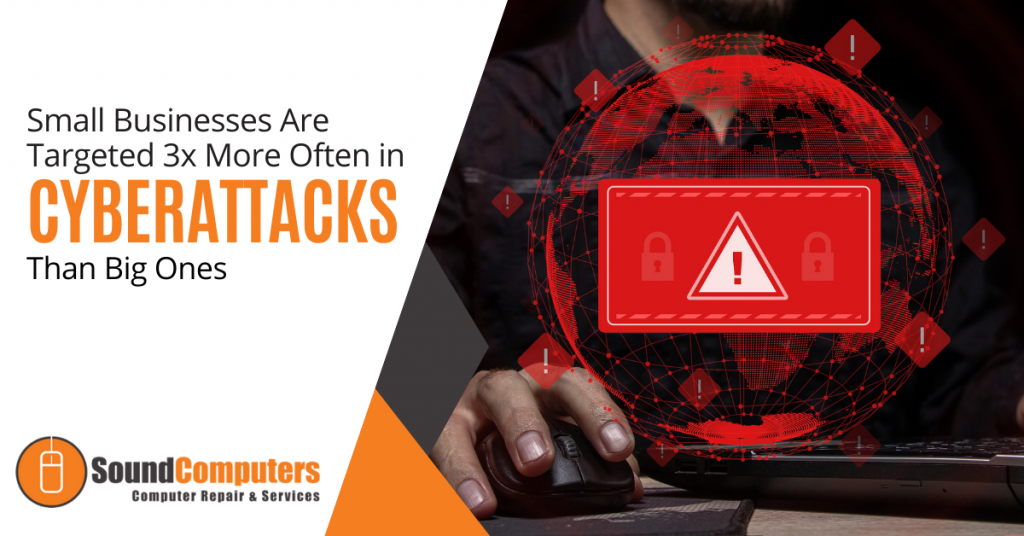
We have seen some of the greatest and most troubling cyberattacks since the birth of the Internet age in the last few years. These hacks appear to be leaning toward larger firms and organizations and include the intrusion on Sony’s PlayStation that claimed the personal information of over 25 million people to the largest password breach ever of 8.4 billion passwords.
However, many of us are unaware that small-medium scale businesses are more vulnerable than large corporations and prime targets of cyberattacks.
According to a new survey, small businesses are 3x more likely to be targeted by cyberattacks than big companies. With 43% of these attacks aimed at small businesses, only 14% of these businesses are prepared to defend themselves. This is because they lack the resources required to protect themselves properly against these attacks. As a result, small businesses face a considerably more significant risk of data breaches.
This article highlights why small businesses are targeted more than big companies.
Why Small Businesses Are Easy Targets for Cyberattacks
Small businesses are appealing targets for various reasons. The most important reason is that they are easier to target than big businesses. The reason for this is simple:
Small Businesses are Often Careless About Security
Smaller businesses are notoriously laidback when it comes to security. Due to their activities, they often believe that they are protected from any malicious attack. However, the opposite is true. Since they usually lack enough resources and experience to adopt effective cybersecurity procedures, they are more vulnerable to successful cyberattacks than larger companies.
Small Businesses are Used as Conduits to Larger Corporations
Small businesses serve as a stepping stone to larger businesses. Since big businesses have complex and up-to-date security defenses, they are often more challenging to access. On the other hand, many small businesses work as subcontractors for large corporations and offer human resource services as well as cleaning, air conditioning and engineering.
Because these small businesses are often electronically connected to these big partner companies’ IT systems, they serve as ideal entry points for cyberattacks to take place.
Greater Exposure to Malware
Small businesses are greatly exposed to malware as they are increasingly moving to e-commerce and digitization. Since they heavily rely on their phones and PCs to do business (whether sending emails or making online purchases) they have an increased risk of malware exposure.
Small-scale enterprises could easily lose passwords, credit card details and personal information due to the simplicity of downloading malware that is routinely concealed in innocent-looking apps or emails.
CEOs and CFOs Are Attractive Targets
Small business owners and employees are also vulnerable to these attacks. Big-ticket accounts are what hackers go after for a takeover. Compared to an average employee’s account, the accounts of the CEO or CFO are likely to be taken over. Cybercriminals use these big-ticket accounts to gather intelligence about the company’s clients or sensitive information to launch attacks within an organization once they gain access.
Another high-value account hackers access is executive assistants. This is because they have access to senior accounts and schedules and can send messages on behalf of executive teams.
Protecting Your Small Business Against Cyberattacks
A single cyberattack on a small business could result in permanent losses and damages. Consider adopting these basic steps to strengthen your cybersecurity to combat the constant threat of an attack:
Get in the habit of using good password strategies.
It’s no surprise that most attacks are carried out on passwords that are common or easy to guess. A little password discipline can prevent a lot of damage. Ensure you don’t use the same password and login details for several accounts and ensure your employees are using strong passwords.
Train your employees on cybersecurity.
Ensure you educate your staff on the basics of cybersecurity such as how to recognize popular phishing attacks, how to avoid opening links from sources that are not verified and how to use secure passwords.
Backup your data.
Data backup is one of the most important ways to protect your business against cyberattacks. Always back up your data either daily or weekly. This will enable you to retrieve data held hostage, lost or deleted.
Control who can access sensitive information.
Ensure that you have several levels of IT security access in place to allow only the most sensitive data to be accessible to those who need it.
Make sure your systems are up to date.
Several of the most well-known attacks are due to outdated software and known vulnerabilities. Ensure your computers and network systems are constantly updated and running the most recent versions. Because many of these updates are designed to address security flaws, you and your staff must take the time to update all of your devices.
Find Affordable Small Business Cybersecurity Solutions
Small businesses receive the hardest hit by cyberattacks. Due to their small size, they are likely to incur reputational damage and risk losing their entire business. Given the severity of the implications, small businesses must take the appropriate precautions to safeguard their systems and data. More should be done to raise cybersecurity awareness, implement suitable security solutions and create a data breach plan.
Sound Computers can play a role in this. We can assist you with updating your company’s security and providing cybersecurity training to your employees.
Call us right now at (860) 577-8060, or use our contact form to set up a consultation.